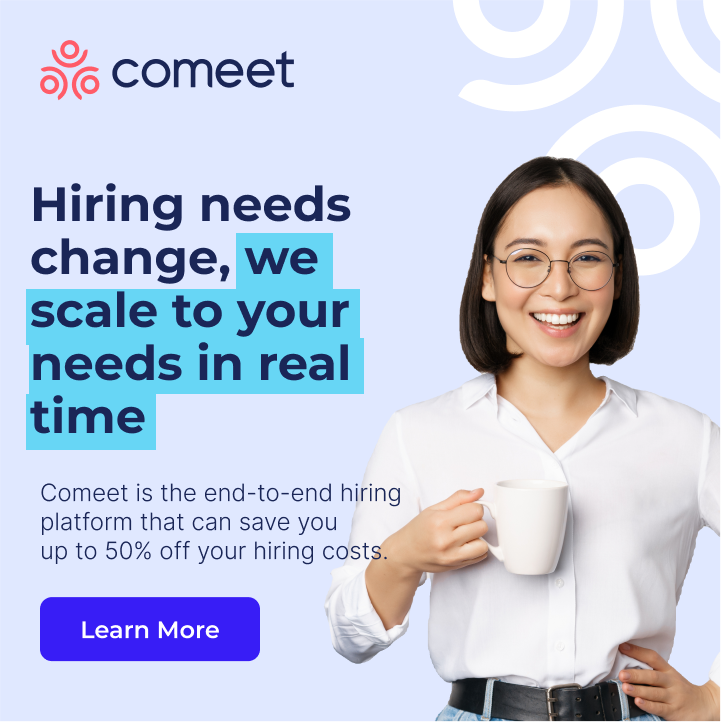If you aren’t satisfied with the time to hire, cost per hire, or any other aspect of your talent acquisition process, it may be time to consider using an RPO — or recruitment process outsourcing. This isn’t a new human resources service, but there have been some exciting developments made in this space over the past few years. In our guide, learn more about how an RPO provider may be able to help reduce your company’s hiring-related pain points.
What is recruitment process outsourcing?
RPO, or recruitment process outsourcing, is the concept of having an outside agency or team handle any or all of your business’ recruiting and hiring functions. The role of the RPO provider is multifaceted. They help produce top talent, and they help reduce inefficiencies in the recruiting process to possibly save time, money, and brand reputation.
RPO services can also offer scalability. This is why they’re popular among companies who experience rapid or unprecedented growth and need a consistent way of continuing to fill open positions with qualified candidates.
How is an RPO provider different from a staffing agency?
While a staffing agency focuses on putting the right people in your existing positions, often at a high cost, an RPO team works with you to bring improvements to your entire process with strategic thinking and long-term solutions. They work with your company to help continue your mission and preserve your culture, not just fill jobs. Staffing agencies are also usually paid a contingency or “headhunting” fee, while RPO is paid an overall service management fee that’s customized based on the level of service they provide.
How does RPO work?
You can choose to use some or all of the services proposed by RPO pros, but the most common way they assist businesses is through these offerings and methodologies.
1. Workforce planning
Before they ever reach out to that first candidate, RPO teams can look at your existing talent network, identify gaps, and plan for future changes in your industry or region. Their data can be a useful resource for determining if you need to update your skill requirements or if you are paying your teams competitively enough to attract the best talent. For industries with ebbs and flows in talent needs, RPO providers can forecast these changes to adjust recruitment methods accordingly.
2. Sourcing
Where do you go to find job candidates? If you rely on the old methods of job fairs and newspaper ads, a solid RPO partner can add even more options to your repertoire. Not only do they have their own network of talent culminated over the years, but they bring years of targeted sourcing methods for your unique industry. They can market, vet, and perfect your messaging to get the candidates that will fit into your culture.
3. Screening
The hiring process can be risky, especially if the right steps aren’t taken to ensure employees value your property, employer brand, and mission. In addition to skill assessments and interviews, a good RPO team can help with additional screening tools such as personality tests and background checks. They are also well-versed in some of the non-tangible assets you want new hires to bring to the team, such as being a good cultural fit and demonstrating an aptitude for advancement.
4. Recruiting and offer management
Making a hire isn’t as simple as it once was, and job seekers are continually asking more of future employers through salary negotiations and benefits requests. You can avoid this back-and-forth with an external service provider, which also guarantees you won’t become emotionally involved or demonstrate bias. The RPO team’s ability to be consistent and on-brand, even during tense mediations, is a plus.
5. Reporting
The future is data. Not only do RPO teams have the tools to collect and measure data, but they can also provide a wide array of reporting options. If you’ve wanted to enhance your hiring through AI or metrics, now is your chance.
What kind of RPO models are there?
There isn’t a one-size-fits-all method of RPO delivery, and many RPO teams will be known for one of the following solutions:
- If you don’t need ongoing support but only want to tackle a single hiring project or growth phase, a project RPO solution is your best bet. They can fill roles quickly without sacrificing quality. Use this type of RPO when you have a definitive goal and timeframe.
- On-demand RPO teams consist of one or two recruiters who work with your existing teams for a limited time. Like a project RPO, they have a definitive hiring goal. You may use them off and on throughout your career.
- If you foresee the role of an RPO provider being a long-term or permanent help, an end-to-end RPO may suffice. This scenario involves using a team for anything from a single corporate office or business line, but with the team handling almost all aspects of the hire. In a truly end-to-end vision, they could be relied on for anything hiring related.
What benefits does RPO bring to the table?
If you’re willing to trust the process, RPO teams have huge advantages. Their expertise translates into quality hires as you spend less of your time and talent on tasks that fall outside your proficiencies. Even if you have an amazing HR department, RPO is specialized enough to know changes in the industry, as they happen, and can adjust best practices accordingly. Other perks include:
- Reduced cost per hire, because you don’t have to hire RPO providers as full-time employees
- Higher retention, because quality candidates are recruited and vetted
- Reduced time to hire, because less time is wasted in markets that aren’t a good fit
- Scalable solutions for every stage of your business growth and evolution
Is RPO right for your organization?
If you thought RPO was only for the biggest businesses and Fortune 500 powerhouses, think again. With so many unique methods of RPO specialization, it’s possible to find just the right service for your individual hiring needs. It’s also more affordable than ever since some providers will easily scale with your needs. That means you won’t have to pay for pricey recruiting tools during hiring freezes or when you need to scale down your teams.
Are you ready to find the right RPO option for your specific needs? Get in touch with Comeet today!





























